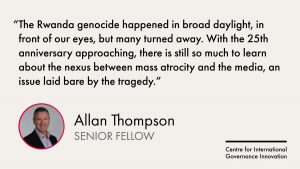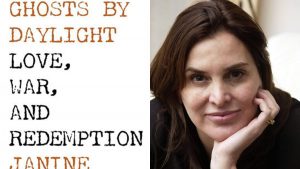Sitting through five anti-hate speech seminars, workshops and events between July 10th and July 18th in and around Abuja and taking note of the frequency of reference to genocide in Rwanda, one could not but contend with many free floating questions about the Nigerian media and genocidal populism, especially as it relates to the Fulani because of the overarching phrase ‘Fulani herdsmen’. So far, no one appears to be speaking up for the media on this. But, is the Nigerian media setting up the Fulani or any other cultural identity in Nigeria for genocide? Should this be the case, is it accidental or conscious? Can the media ignite genocide in Nigeria or anywhere at all? What is the comparative evidence in this regard, globally?

So says the editor of the book Media and Rwanda Genocide, published in 2007
The idea that the media can or have ignited or has been a force for triggering genocide appears well established. Generally, media scholars and peace practitioners are united in isolating the media for being a major force for escalation in all the major tragedies that occurred after the Cold War – Bosnia, Rwanda, Burundi, Georgia, etc. Specifically, the coup de grace came in the December 2003 judgment of the U.N. International Criminal Tribunal for Rwanda which convicted three Rwandan media executives. These are Ferdinand Nahimana and Jean-Bosco Barayagwiza, two executives of Radio Télévision des Mille Collines (RTLM) and Hassan Ngeze, owner of the Kangura newspaper. They were sentenced to prison terms which ranged from 35 years to life imprisonment. Their crime is incitement and conspiracy to commit genocide and crimes against humanity. The tribunal concluded that, even though their actions preceded the onset of the genocide by several years but that articles written and published by Ngeze created the psychological disposition among Rwanda’s population that made genocide possible, adding, “without a firearm, machete or any physical weapon, you caused the deaths of thousands of innocent civilians”.
But, did the media set Rwanda on fire through genocidal populism in 1994? The starting point would be the analysis of the judgement particularly by those who posited that the most important question the International Tribunal on Rwanda was posing with the trial of Ngeze and his two co-defendants is the way each modern case of genocide, from Hitler to the Bosnia and to Rwanda, has been preceded by a propaganda campaign transmitted via mass media and directed by a handful of political leaders. They suggested that the logic behind the conviction of the journalists had more to do more with averting genocide by sopping such campaigns through deterrence rather than guilt that could be empirically established. Otherwise, the operative phrase should have been “a handful of political leaders”
If deterrence could be such a powerful logic in that conviction, why is the media still held responsible when people should have been talking about how the powerful use the media to create wars? The word powerful here does not exclusively refer to people in government but broadly speaking. Would sticking to such line not amount to wilful forgetfulness of the inherently progressive sociology of the newsroom? Of course, the sociology of the newsroom is inherently so because, traditionally, even the most conservative media sympathises with the downtrodden. Again, this only doesn’t happen when powerful actors are not relentless in accomplishing a mission of violence by manipulating the media! There is a beautiful Nigerian example of such. By the authority of Prof Jibrin Ibrahim, some top officials of the National Broadcasting Commission, (NBC) were aghast as the Nigerian Television Authority, (NTA), was running the advertorial on candidate Buhari and Bola Tinubu, his acolyte, in 2015. They called the NTA with a view to instructing them to stop it but they were told it was on express orders from the seat of power. It is not clear if NTA no longer receive such orders from the seat of power in the aftermath of 2015.
Where then might the wholesome and persistent framing and blaming of the media’s role in conflict coming from? Where might it be coming from that it is not even prepared to acknowledge the great emancipatory force the media has been in the 21st century even in the paradoxical situation the geopolitical and technological revolutions that closed the 20th century threw it into? That is an assertion that can be argued.
 One instance here must be the move by journalists and friends of the media who could see quite early that the post Cold War would be such a stormy moment for the media even as the media has emerged so powerful in the era. A specific example must be Felicia Langer, the Israeli lawyer reported by Professor Ken Booth to have suggested to Janine di Giovanni, the Yale University super reporter of recent wars on how to do it better. According to Booth, Langer told Giovanni in the late 1980s to change course in her conflict reporting to one of writing about small voices. That is, “the people who cannot write about themselves”. What might be so great in that advice? The answer is the attempt in that advice to challenge the constitution of journalism to serve power and the powerful since the birth of industrial capitalism. This comes in the logic of the voice of power that is privileged by the typical journalist inducted in journalism schools to understand the credo of confirmation of a story in terms of when the police, the minister, the governor, the president or any voice of authority speaks, not the small voices the Felicia Langers of this world would tell Giovanni to focus on. So, in Nigeria today, when a story has no byeline and it is not attributed to anybody because such sources are vulnerable before power, the story is seen as fake, conjured up. Felicia Langer saw through this.
One instance here must be the move by journalists and friends of the media who could see quite early that the post Cold War would be such a stormy moment for the media even as the media has emerged so powerful in the era. A specific example must be Felicia Langer, the Israeli lawyer reported by Professor Ken Booth to have suggested to Janine di Giovanni, the Yale University super reporter of recent wars on how to do it better. According to Booth, Langer told Giovanni in the late 1980s to change course in her conflict reporting to one of writing about small voices. That is, “the people who cannot write about themselves”. What might be so great in that advice? The answer is the attempt in that advice to challenge the constitution of journalism to serve power and the powerful since the birth of industrial capitalism. This comes in the logic of the voice of power that is privileged by the typical journalist inducted in journalism schools to understand the credo of confirmation of a story in terms of when the police, the minister, the governor, the president or any voice of authority speaks, not the small voices the Felicia Langers of this world would tell Giovanni to focus on. So, in Nigeria today, when a story has no byeline and it is not attributed to anybody because such sources are vulnerable before power, the story is seen as fake, conjured up. Felicia Langer saw through this.

CNN’s Christine Amanpour
Before Langer gave her advice, Christine Amanpour had said in response to criticisms of her coverage of Kosovo that it is wrong for a journalist to report a conflict as a case of two fighting when the two conflict parties are one giant against a midget. Before Amanpour, there was Martin Bell’s 1988 argument for ‘Journalism of Attachment’ as against the journalistic principle of objectivity in reporting conflicts. For Bell, (1998), objectivity produces ‘bystander journalism’ or conflict reporting that does not go beyond military strategies and technology, rather than the people. Of course, there had come up the ‘CNN Effect’ thesis and its claim of taking over the diplomacy of conflict management from diplomats because real time reporting makes it impossible for governments not to hurry up intervention to halt mass suffering anywhere in the world. Those who poked nose at ‘CNN Effect’ as exaggerated celebration of nothingness have since been reminded of its disruptive nature for hegemonic power scripts and which means ‘CNN Effect’ has a dosage of radical humanism in it even as exaggerated as the claim might have been.
It is still possible that one is being gleeful and celebratory of the media. After all, all the four examples of advocacy cited above – Langer, Amanpour, Bell, ‘CNN Effect’ – attacked objectivity as a credo of reporting by implication. Yet, that is still what guides training in Mass Communication in some borderlands, Nigeria inclusive, even when that credo is at the heart of the media as a paradox, a huge burden on the average journalist and on the world in spite of its democratic potentials.
As Peace Journalism trainers see it, every journalist sees him or herself as reporting the facts and, therefore, free of the consequences of his or her reporting. But facts are interpretations in which one man’s meat could be another woman’s poison. In all cases, the journalist cannot win. A single story can endear him or her to a great fortune just as it could lead to his death, including an issue he or she knows nothing more than what s/he wrote. In 1996, a doctoral student wrote what has become a classic. Titled “Journalism and Conflict”, its high point when it comes to teaching Media and Conflict or News Reporting in our universities would be where the author was saying that by reporting that A struck at B, a journalist is already implicated in a conflict because the sentence is suggesting by the logic of sequence that A triggered the violence. That example also illustrates the dilemma of the journalist.
So, in spite of its solid democratic principles of balance, fairness and timeliness, journalism is unable to enable democracy on any grand scale unique to it. It is held down by its contradictory location in the dynamics of power and violence. Every claim of media involvement in violence that fails to reckon with this context is guilty of flying false flags.
The falsity is there in the location of the genocide in Rwanda, for instance, by almost every other scholars of it in, among many others, Rwanda’s colonial history, the collapse of the price of coffee after American farmers pressurized their government to stop subsidizing the world market of the product, World Bank and International Monetary Fund policies, the global interests of the great powers, particularly France, the interests of international aid agencies and Western attitudes towards Africa. This is the point behind the weighty voice of those such as Professor C. S. Hamelink who considers the attribution of the genocide to the media as monocausal and one-dimensional explanation because, as most writers on the genocide say and correctly too, the media could not have but merely tapped into a context of social discontent, war, high population growth rate, economic crisis, regionalism, historical ethnic conflict opposing Hutus to Tutsis, bad leadership and such external forces as the structural adjustment programme and the rivalries between foreign powers, a combination of which led to the genocide.
In other words, the media can generate genocide anywhere but only in the context of other numerous actors and factors. Why is bringing-in such actors and factors not part of the current anti-hate speech campaign in Nigeria by the scholars, critics, campaigners and people in power running the show? What is the guarantee that we would not have to be mounting a ‘rescue’ campaign for a different ethnic group every time the elite are lost in a succession struggle if we continue at this rate? Are we condemned to this cycle of crisis which we are probably unable to transcend because our discourse of the cycle itself is limiting our scope for action?




























